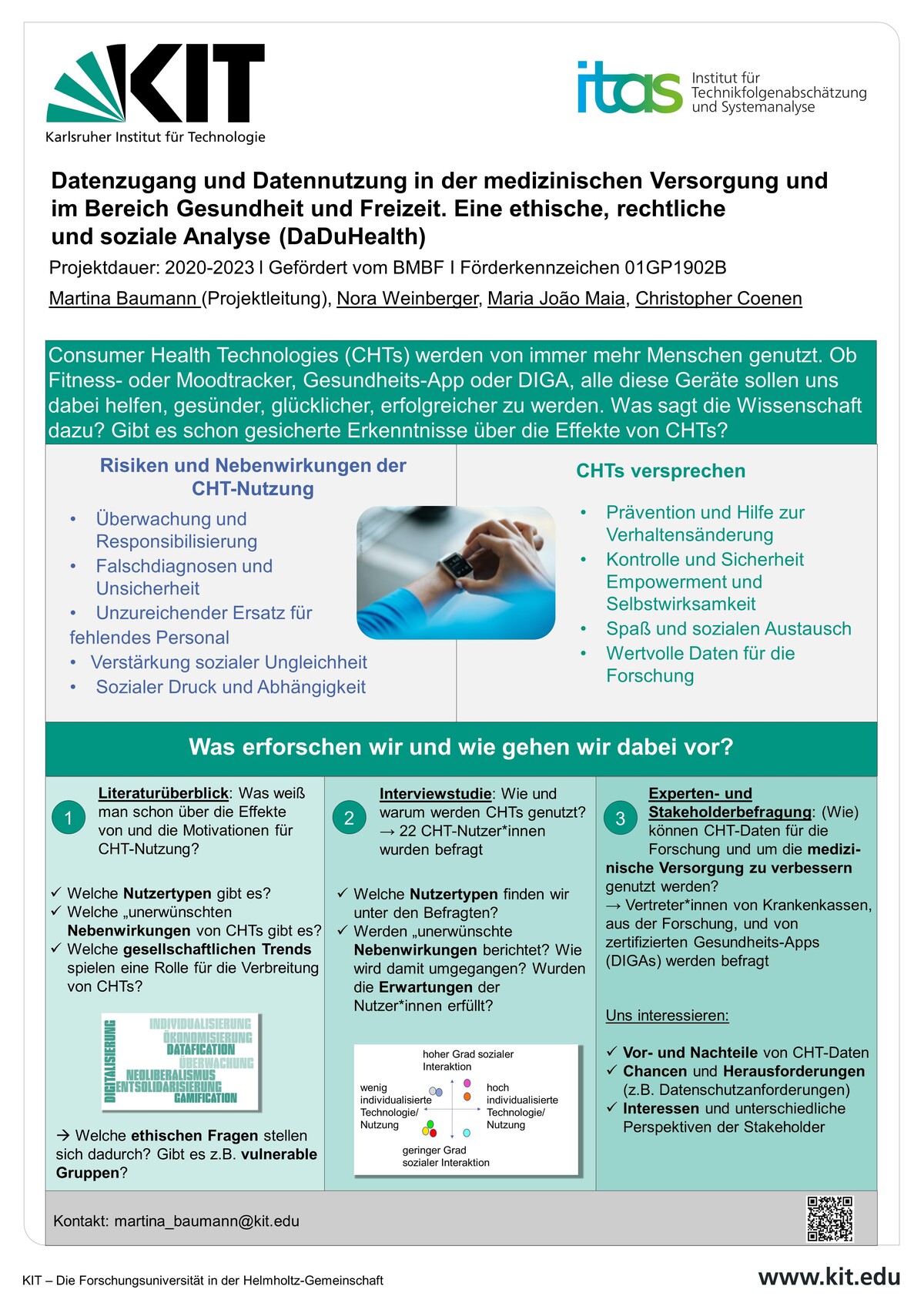Data Access and Data Use in Medical Institutional and Consumer Health Settings. An Ethical, Legal, and Social Analysis (DaDuHealth)
- Project team:
Baumann, Martina (Project leader); Nora Weinberger, Silvia Woll, Maria João Maia, Christopher Coenen
- Funding:
BMBF
- Start date:
2020
- End date:
2023
- Project partners:
University of Freiburg, Institute for Ethics and History of Medicine (consortium leader); Medical Center – University of Freiburg, Translational Neurotechnology Lab, Department of Neurosurgery; University of Freiburg, Department of Philosophy; University of Freiburg, Institute of Public Law; Fraunhofer Institute for Digital Media Technology IDMT (subcontract)
- Research group:
Project description
Accessing and using accumulated large amounts of health-related data for biomedical research is one of the most dynamic fields of innovation in healthcare. Contextual conditions of health data use and access may vary greatly, from medical institutional settings to consumer technology for health and well-being where individuals generate and share health-related data outside of clinical care. Understanding and evaluating the legal and ethical principles and justifications, social contexts, and stakeholder interests regarding this kind of big data use is an important and pressing societal challenge. Our research consortium aims to develop a hard law and soft law framework for the collection, use, and access of health-related data in Germany. The project provides an in-depth conceptual analysis of key ethical tensions regarding data use and develops a comprehensive conceptual ethics framework. Specifically, the project maps and analyzes, firstly, the collection, access, and use of health-related data at a data integration center of a large tertiary clinical care center. Secondly, it investigates the circumstances, barriers, social trends, as well as stakeholder and user actions and perspectives regarding data use and access in the consumer health technology setting. Based on these analyses and frameworks, the project develops recommendations for collection, access, and use of health-related data in both settings. The project uses interactive formats of public outreach and science communication to involve the broader public.
Within DaDuHealth, ITAS is responsible for the implementation of a subproject on 1) user actions (i.e. the behavior and the meaning assigned to it) of health technology users uploading data generated by these technologies to online portals and on 2) the social context of these actions. Both parts of this social science analysis shed light on the conditions for success and the obstacles to a socially beneficial and ethically acceptable use of these data.
In this context, user behavior and its social relation are investigated against the background of current social phenomena such as the self- and life-logging movements, the rise of self-tracking technologies and new forms of DIY/hacking cultures. Broader social developments such as the trends towards a performance-enhancing society, the entrepreneurial self and self-optimization as well as the medicalization of the social are considered too. Based on notions of actions and social contexts, the subproject therefore does not deal with preferences and behaviors of CHT users in isolation, but rather with the question how their actions are embedded in or related to meanings, attitudes, values, interests, and interactions of interest groups, viewpoints on broader social developments, and role changes (e.g., consumer-producer and patient-health expert).
In order to enable a deeper understanding of the current CHT-based generation of health data and its use as well as future perspectives in this field, ITAS will also conduct three case studies with different forms of interaction with CHT users and stakeholders. The first case study will be an interview-based, in-depth analysis of at least one online health data platform. The second case study will analyze user perspectives and possible applications of a technologically advanced and very data intensive and sensitive mHealth application. For this case study, ITAS will cooperate with Fraunhofer IDMT in a subcontract. The third case study will analyze “Open Humans”, a platform that defines itself as dedicated to participant-oriented research and the study of personal data. These case studies will be followed by a workshop for experts, stakeholders, and users.
In the overall view of the results of all project partners, the work of ITAS will focus on governance issues, follow an integrative RRI approach, and include analyses of potentially citizen-driven innovations and the impacts of the further dissemination of CHT-generated online data in different social contexts.
Events
| Dates | Title |
| 07.04.22 - 08.04.22 | Privatsphäre, Datenschutz, Gemeinwohl: Ethische, rechtliche und soziale Herausforderungen der Nutzung von Gesundheitsdaten für die Forschung |
| 24.03.23 | DaDuHealth Workshop |
| 24.03.23 | Zukunft der Forschung an Gesundheitsdaten: Podium und interaktive Ausstellung |
Publications
Self-monitoring of health - user viewpoints on gathering data using consumer health technologies during leisure time
2025. Frontiers in Digital Health, 7. doi:10.3389/fdgth.2025.1588183
Meeting report: „Privatsphäre, Datenschutz, Gemeinwohl: Ethische, rechtliche und soziale Herausforderungen der Nutzung von Gesundheitsdaten für die Forschung“ : Conference, 2022, Karlsruhe, DE (hybrid)
2023. TATuP - Zeitschrift für Technikfolgenabschätzung in Theorie und Praxis, 31 (3), 82–83. doi:10.14512/tatup.31.3.82
User types, psycho-social effects and societal trends related to the use of consumer health technologies
2023. DIGITAL HEALTH, 9, 205520762311639. doi:10.1177/20552076231163996
Schritte, Herzfrequenz, Schlaf, Trinkmenge… sind wir Sklaven oder Meister unserer Selbstvermessung?
2023. Vortragsreihe Xtra-Tracks - Facetten der Selbstvermessung (2023), Heilbronn, Germany, June 14, 2023
Erfahrungen mit Consumer Health Technologies – Ergebnisse eines narrativen Reviews und aus Interviews mit Nutzenden
2023. DMEA : Connecting Digital Health (2023), Berlin, Germany, April 25–27, 2023
CHT-Datennutzung – Erfahrungen, Herausforderungen und Potenziale aus Stakeholder*innen und Nuzer*innenperspektiven
2023. Workshop DaDuHealth : Abschlusskonferenz des Projekts (2023), Freiburg, Germany, March 24, 2023
Consumer Health Technologies im Spiegel gesellschaftlicher Trends
2022. Midterm Konferenz/Projekt DaDuHealth (2022), Karlsruhe, Germany, April 7–8, 2022
Consumer Health Technologies – societal trends, user behaviour and use of CHT data for research
2022. Tagung zur Digitalisierung in Medizin und Gesundheitswesen (2022), Berlin, Germany, September 1, 2022
Contact
Karlsruhe Institute of Technology (KIT)
Institute for Technology Assessment and Systems Analysis (ITAS)
P.O. Box 3640
76021 Karlsruhe
Germany
Tel.: +49 721 608-23019
E-mail


